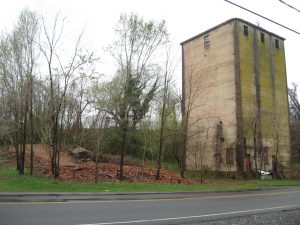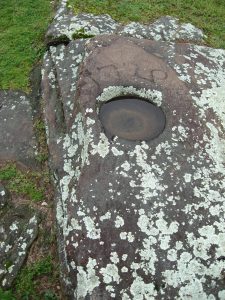Fredericksburg to Implement City-Wide Archeological Ordinance

Grain Elevator at the Germania Mill Complex in Fredericksburg, Virginia
The Fredericksburg, Virginia City Council has initiated amendments to City Code 72, the Unified Development Ordinance, to create an ”Archaeological Preservation District” as an overlay district and to amend the zoning map to include the boundaries of the overlay district. These amendments will satisfy a long-term goal of the City Council, to ensure that the City’s archeological record is not lost and to define the city as a historical and cultural destination. The ordinance is scheduled to take effect with the new fiscal year, on July 1, 2020, and will have implications for development projects in the City. Wetland Studies and Solutions, Inc.’s archeologists can help you navigate the changes; see below for details on this new aspect of City review.
Which projects will the City review?

“The Indian Punch Bowl,” with historic petroglyph reading 1720 in Fredericksburg, Virginia
Projects reviewed by a federal agency and the Virginia Department of Historic Resources (DHR) under Section 106 of the National Historic Preservation Act in association with a federal undertaking such as Clean Water Act permitting or HUD funding will be exempt from the local ordinance. For all others, City staff will evaluate project requirements based on the project location relative to the new Archaeological Preservation District. The District boundaries will rely on a GIS-based predictive model showing the areas within the city most likely to yield prehistoric or historic archeological resources. The model includes the locations of known archeological sites, archival research, historic maps, and environmental and topographical data. A map of the District is not available at this time.
Projects Requiring a Minor Site Plan, Residential Lot Grading Plan, or Certificate of Appropriateness
The ordinance includes two tiers of regulation relevant to properties within the Archeological Preservation District. For projects that require a minor site plan, residential lot grading plan, or certificate of appropriateness, the application will be subject to administrative archeological review. If the City determines that an archeological resource will be impacted by the project, the City will coordinate with the property owner to arrange for archeological monitoring during ground disturbing activity. If archeological resources are discovered during monitoring, the City may interrupt site work for up to one week to conduct archeological investigations. The City of Fredericksburg will provide a professional archeologist at its expense for the monitoring and any potential additional investigations when archeology is required pursuant to a minor site plan application.
Projects Requiring a Major Site Plan

Ruins at the Rappahannock Electric Light and Power Company Site in Fredericksburg, Virginia
At a minimum, a Phase IA archeological investigation of all areas subject to land disturbance will be required for projects that require a major site plan; the Phase IA archeological reconnaissance report is submitted with the major site plan application. The developer or project owner will be responsible for hiring a professional archeologist and funding any needed studies in such cases. The City may require additional investigation or avoidance of any potentially significant archeological resources identified. The project owner may alternately provide a complete Phase I archeological investigation report and reports documenting any completed Phase II and Phase Ill investigations with the initial investigation.
If a potentially significant archeological resource is found during a Phase I archeological investigation conducted in association with a major site plan application, the City will work with the project owner to draft a memorandum of agreement regarding treatment of the resource. Typical approaches to treatment would include avoidance of impacts to the archeological resource or Phase II archeological evaluation of the resource to determine its significance and Phase Ill archeological mitigation of the resource if it is determined significant and will not be avoided.
City requirement for additional archeological work above the Phase I-level for projects subject to major site plan approval will be determined based on established local research priorities. Currently, City staff are prioritizing resources associated with the history of urban slavery, resources associated with Fredericksburg’s free black community in the 18th and 19th centuries, the canal systems, and resources associated with mining, quarrying, and riverine trade.
What does this mean for my projects?
An unexpected cultural resource investigation can put a project off schedule, so we highly recommend being prepared for all proposed projects in the City of Fredericksburg. To discuss the implications of this proposed Ordinance on your projects, please contact Boyd Sipe or John Mullen in our Gainesville, Virginia office.
